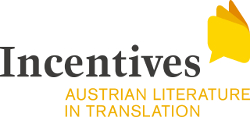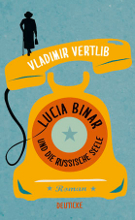- Das Haus
- Newsletter
- Service
- Publikationen
- Veranstaltungen
- NEU Livestream
- Ausstellungen
- Buchmagazin & AutorInnen
- AutorInnen
- AUFTRITTE
- Rezensionen Buch
- Rezensionen 2019
- Rezensionen 2018
- Rezensionen 2017
- Rezensionen 2016
- Rezensionen 2015
- Rezensionen 2014
- Rezensionen 2013
- Pressespiegel 2000-2010
- AutorInnen A
- AutorInnen B
- AutorInnen C
- AutorInnen D
- Autorinnen E
- AutorInnen F
- AutorInnen G
- AutorInnen H
- AutorInnen I
- AutorInnen J
- AutorInnen K
- AutorInnen L
- AutorInnen M
- AutorInnen N
- AutorInnen O
- AutorInnen P
- AutorInnen Q
- AutorInnen R
- AutorInnen S
- AutorInnen T
- AutorInnen U
- AutorInnen V
- AutorInnen W
- AutorInnen Z
- Incentives
- Rezensionen Sachbuch
- Verlage
- Dank an Verlage
- Impressum
- Bibliothek & Sammlungen
- Katalogsuche
- Partnerinstitutionen





FÖRDERGEBER
PARTNER/INNEN

 Vladimir Vertlib: Lucia Binar und die russische Seele (Lucia Binar and the Russian Soul). de en fr span cz Kurt Tucholsky defines humour as the feeling "that what we do here looks abundantly nonsensical when seen from above". Vladimir Vertlib says that the source of his writing is "the experience of emigration and family legends". In addition, literature also inspires him. In this novel, the inspiration is provided, on the one hand, by the poets who are quoted above all by Lucia Binar and Victor Viktorovich Vint, and on the other hand, by Mikhail Bulgakov’s classic The Master and Margarita. In Vertlib, the intention is of course not to refer to transcendental powers, but rather simply to reveal rather the absurdity of the present. Abridged version of the review by Helmut Sturm, 9. April 2015.
|
| Veranstaltungen |
|
Junge LiteraturhausWerkstatt - online
Mi, 13.01.2021, 18.00–20.00 Uhr online-Schreibwerkstatt für 14- bis 20-Jährige Du schreibst und...
Grenzenlos? (Literaturedition Niederösterreich, 2020) - online
Do, 14.01.2021, 19.00 Uhr Buchpräsentation mit Lesungen Die Veranstaltung kann über den Live... |
| Ausstellung |
|
Claudia Bitter – Die Sprache der Dinge
14.09.2020 bis 25.02.2021 Seit rund 15 Jahren ist die Autorin Claudia Bitter auch bildnerisch... |
| Tipp |
|
LITERATUR FINDET STATT
Eigentlich hätte der jährlich erscheinende Katalog "DIE LITERATUR der österreichischen Kunst-,... |
|
OUT NOW flugschrift Nr. 33 von GERHARD RĂśHM
Die neue Ausgabe der flugschrift des in Wien geborenen Schriftstellers, Komponisten und bildenden... |